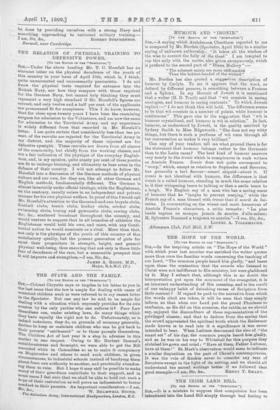HUMOUR AND " IRONIE."
[TO TRII EDITOR ON TUB " OPROTLTDR."1
Si,—A saying which Archdeacon Cheetham reported to me is compared by Mr. Burden (Spectator, April 10th) to a similar saying of unknown authorship : "It takes all the wisdom of the wise to correct the folly of the Good." I am tempted to cap this sally with the motto, also given anonymously, which is prefixed to the second part of "Diana Mallory" :--
"The soberest saints are more stiff-necked
Than the hottest-headed of the wicked."
Mr. Burden has also quoted. a suggestive description of humour by Carlyle. To me it appears that the word, as defiued by different persons, is something between a Proteue and a Sphinx. In my Memoir of Jowett it is mentioned that a writer (H. D. Trull) said that "wit consists in seeing analogies, and humour in seeing contrasts." To which Jowett replied :—" I do not think this will hold. The difference eeems to be that wit consists in a number of points, while humour is continuous." This gave rise to the sugg.u-stion that "wit is humour crystallized, and humour is wit in solution." In fact, humour, as understood by Jowett, is the quality ascribed by Sydney Smith to Miss Edgeworth : "She does not say witty things,.but there is such a perfume of wit runs through all her conversation as makes it very brilliant."
Can any of your readers tell me what ground there is for the statement that humour belongs rather to the Germanic than to the Latin races? The beet kind of humour answers very nearly to the ironic which is conspicuous in such writers as Anatole France. Tronie does not quite correspond to " irony," whieb, except in relation to Sopbocles and Socrates, has generally a tart flavour—antari aliguid—about it. If ironie is not identical with humour, the difference is that ironie is a veiled humour, standing in much the same relation to it that whispering bears to talking or that a smile bears to a laugh. We English say of it man who has a saving sense of humour that he "laughs to prevent weeping," while the French say of a man blessed with ironie that il sourit de lui- lame. In commenting on the wisest and most humorous of Anatole France's characters, a critic remarks : " La plus haute sagesse ne manque jamitis de sourire d'elle-mome; M. Sylvestre Bonn.ard a toujours cc sourire."—I am, Sir, etc.,
LIONEL A. TOLLEMACIIIL Athenteum Club, Pall Mall, S.W.






































 Previous page
Previous page